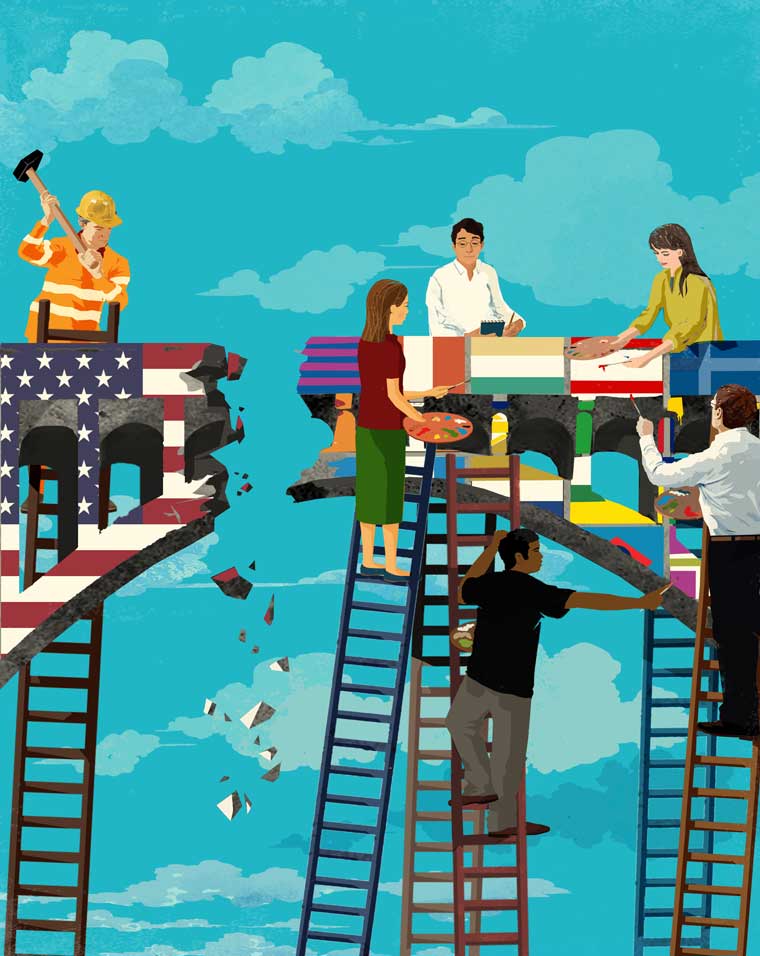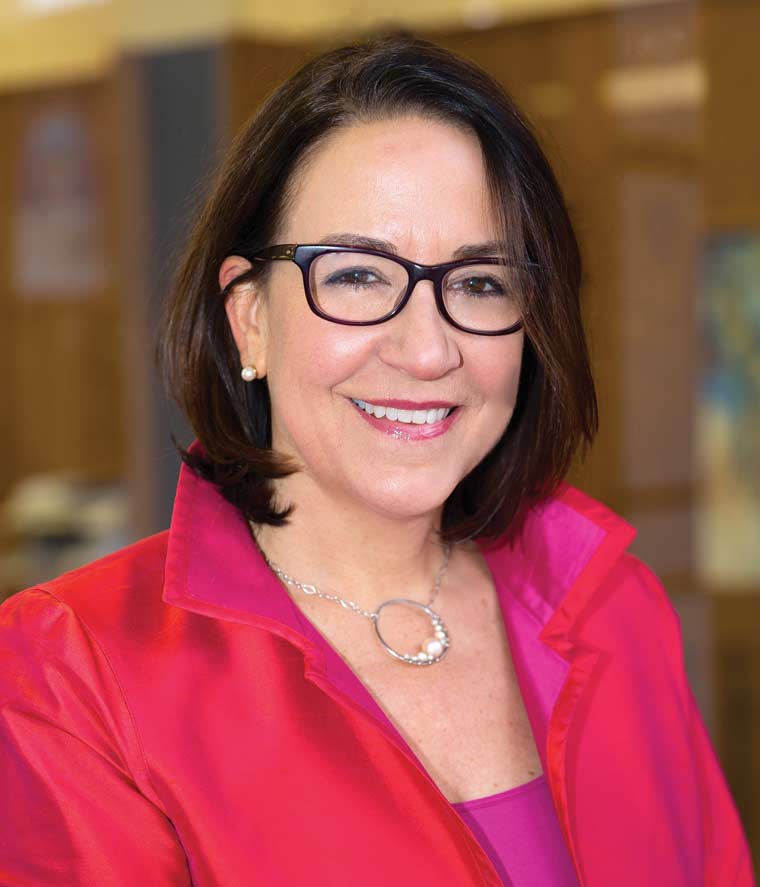Ambassador Brooke Anderson ’86 advised two United States presidents on national security and took part in negotiations that led to the Iran Nuclear Agreement. She has a few thoughts on the current state of American diplomacy.

Minutes after Brooke Anderson ’86 walked into her White House office on a February day in 2012, she was asked to fly to Egypt to help prevent the imprisonment of Americans working to advance democracy and human rights in the country. No day in the West Wing was ever typical for Anderson, one of President Barack Obama’s top advisers and chief of staff for the White House National Security Council. But that “whirlwind trip,” she says, called on all of her negotiating skills.
“To be a good diplomat you need to listen,” Anderson says. “You need to understand not just what the person on the other side of the table is saying, but also what it is they actually need and want, and to have a clear understanding of what you are trying to achieve. You also need to be creative, and you need to know historical context.”
“It’s really important to seek out and listen to people who don’t see things the way you do, to hear and listen to people with different perspectives.”
Her diplomatic efforts helped secure the safe departure from Egypt of the accused Americans, just one memorable moment in a career highlighted by high-stakes negotiations, such as her role in the 2015 nuclear agreement with Iran. On May 1, 2011, Anderson was in the White House Situation Room with Obama and other members of the national security team, tracking the progress of the raid on Osama Bin Laden’s compound in Pakistan. “There are some challenges to American security where diplomacy is not an option,” Anderson says. “It was a very intense day, and President Obama showed both tremendous wisdom and courage in making the decision he did.”
Anderson says the political science and philosophy courses she took as an undergraduate inspired her passion for a world devoid of nuclear and biochemical weapons, poverty, and wars. Especially influential were her don, Charlotte Price (economics, emerita), a course she took on Eastern and Western political philosophy, and the year she spent studying abroad in Paris, where she took a class in post–World War II politics that deepened her interest in international affairs. “Sarah Lawrence opened my eyes to what is going on in this big world we live in,” she says. And in classic SLC fashion, she decided, “I could make a difference.”
As a senior, Anderson landed an internship at the United Nations, which became one of her three courses for that semester. “The biggest thing impressed upon me from that experience was that there is this place where diplomats from around the world come together every day and figure out how to resolve problems off the battlefield,” she says. “I thought, ‘I want to do work like this.’”
“I don’t think I am being too dramatic when I say the survival of our democracy depends on our ability to work with other countries. ...”
The path that led Anderson to return to the United Nations in 2009, first as chief of staff and counselor and then as an ambassador under the Obama administration, started on Capitol Hill. In the 1990s she worked as an aide to two US Representatives, then rose to senior positions in the Clinton administration, ultimately as special assistant to the president for national security affairs and senior director for communications at the White House National Security Council.
In 2007, Anderson was one of a handful of foreign policy advisers working with Obama’s presidential campaign. “I was deeply concerned about the state of United States relations and influence in the world and how that affected our security,” she says. “I thought his perspective and views were just what was needed, and I knew he had the ability to put the country on a better course.”
Anderson served in the Obama administration until 2012, then returned two years later to help secure the Iran nuclear deal. Her work has long been informed by her belief in open dialogue with those who have different views.
“It’s really important to seek out and listen to people who don’t see things the way you do, to hear and listen to people with different perspectives,” she says. “It’s very easy to get in a bubble and be surrounded by people who are all thinking the same way.”
These days Anderson is concerned about the turmoil the Trump administration has caused with longtime American allies. “We are taking a wrecking ball to partnerships and alliances we need,” she says. “There is going to be a lot of cleanup work.”
Anderson also expresses concern about the “damage” done to the State Department as the administration pushes out or lets go career officials with decades of experience and fails to fill numerous ambassador posts.
“I don’t think I am being too dramatic when I say the survival of our democracy depends on our ability to work with other countries and galvanize collective efforts to address the existential threats we face, the things that could change our world as we know it,” Anderson says. “We cannot defend against climate change, pandemics, or nuclear terrorism in isolation. An approach to foreign policy that basically believes we can bully the world into doing what we want and don’t need other countries for our security is wildly off course.”
In 2012, Anderson left the White House for Bozeman, Montana, where she married her childhood friend James Salter and became stepmother to his two young children. She started teaching at Montana State University, offering a course called “National Security Policy Decision-Making: Sitting in the Hot Seat at the White House.”
Anderson did not stay away from government for long. In 2014, when Secretary of State John Kerry asked her to accompany a US delegation working on a nuclear deal with Iran, Anderson says, she was “packed up and off to Vienna within moments.”
The agreement subjected Iran to the most rigorous nuclear inspections, verification, and accountability of any country on earth. “This was one of the great multilateral diplomacy challenges and achievements in recent memory,” Anderson says. So when Trump withdrew from the agreement earlier this year, Anderson says, “It hit me in a different way with a different kind of intensity.
“It was hard for me because there wasn’t an actual vision on the other side, thinking there was a better way to prevent Iran from obtaining a nuclear bomb,” she says. “It was about destroying something that someone else had created and, in doing so, it was the US walking away from a commitment we made to the world that had taken so many years and so much effort—and it was working. There was no reason.”
So what’s it like to sit on the sidelines and witness the unraveling of such an intense diplomatic campaign? “Part of what I am doing,” she says, “is telling people not to feel hopeless and powerless and to get involved and act on their conviction.”
Through her consulting firm, the Hyalite Group, Anderson continues to work on behalf of issues close to her heart, such as global water protection and curbing nuclear weapons and biological threats. She’s also a court-appointed special advocate for children in abuse and neglect cases in Bozeman.
“If you think about the thing that drove me to go into government, it was looking at the world around me and wanting to take on some of the injustices, things I didn’t like,” she says. “There are different ways to drive change, and doing it through government is not the only way.”
Written by Diane Herbst
Illustrated by Eva Vázquez
Photo courtesy of Brooke Anderson
